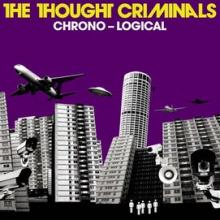The Thought Criminals occupy just about the same international cultural space that the Bicycles do. And while that latter band might be more consistent musically, what the Criminals were able to work up during the first stage of its career is on par with just about any DIY punker act from the era.
Collected on Chrono-Logical are the early would-be hits and the later relative failures of the Thought Criminals. There’s not a huge focus on the Orwellian future – at least in blatant terms. But it serves as bedrock for the majority of the songs here.
Most impressive is the fact that the Criminals were of such a staunch political position that “I Won't Pay” takes Malcolm McLaren to task for being a business man. Yeah, that’s completely apt. At the same time, though, without that man ruining the New York Dolls and organizing the Pistols, punk would look dramatically different than it does today. The song’s still pretty funny, though.
Moving past even that critique, in a relatively recent interview Roger Grierson, the Criminals guitarist, chastises the Clash as being hypocrites (not a tough argument to make) and takes their bass player, Paul Simonon, to task for being “thick as a brick.” While that doesn’t qualify as a gutsy move, it’s amusing, especially in light of the fact that Grierson has focused on the business end of music since the Criminals split up.
Whatever.
Apart from the aforementioned cut, there’re a huge number of pop inflected, speedy punk numbers here capable of entertaining everyone from power-poppers to Buzzcocks’ enthusiasts. “Edge of Time” even winds up sounding like the Desperate Bicycles – or maybe New York’s the Feelies a bit. But all of the musical references dashed over the band’s discography here point out that there were a huge number of group’s preceding the Criminals formation. That’s not good or bad, but a decent example of how to round up influences and spit out something new and engaging.
